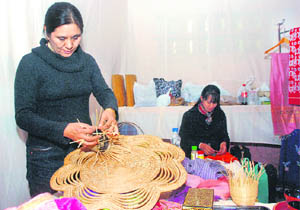|
Fair
art at work
Women artisans are forging
new links among South Asian nations,
writes Madhusree Chatterjee

Members of the four-woman team from Myanmar showcase their lotus fabric scarves and lacquerware Photo: Manas Ranjan Bhui |
Women
are the
new driving force behind the colourful and rich South Asian
crafts traditions. The power of women unfolded at Dilli Haat,
the Capital’s ethnic mart, recently when 70 women artisans
from seven South Asian nations unveiled their wares at the 24th
annual Crafts Mela of the Dastkari Haat Samiti, a handicrafts
promotion forum.
The two-week
showcase, "Crafting Friendships", has brought ethnic
handicrafts from Afghanistan, Bangladesh, Bhutan, Myanmar,
Nepal, Pakistan and Sri Lanka while nearly 190 craftspersons
from across India are also displaying their traditional products
at the fair.
Up for sale is
an array of embroidery traditions, apparel, fashion and
lifestyle accessories, home decor, wood and metal craft.
The Dastkari
Haat Samiti, an initiative by politician and crafts activist
Jaya Jaitely, who was instrumental in setting up Dilli Haat in
1994, has been engaging with South Asian women to promote
regional crafts and forge linkages for revival and strengthening
of the largely unorganised sector since 2004.
The fair is
supported by the Indian Council for Cultural Relations (ICCR)
and the Jamia Millia Islamia. "The focus of the fair in
2011 is to understand crafts and create new friendships through
crafts. Women in South Asia have a major role to play in the
development of the region, promotion of peace and to help stop
violence. They will spend two weeks together to understand
diverse regional skills and identify marketing avenues —
building solid linkages in the process," Jaitely said.
"This is a
sector which is still largely decentralised. In India, there is
a will on the part of the government to encourage crafts, but
the way to about it is too rigid. The government does not want
to know the heart and soul of the sector," she said.
"I wish
the Indian crafts could see some of the boom in Indian art
industry. The craftspersons in the country should be given due
recognition both in the Indian market and abroad," veteran
crafts activist Laila Tyabji, who manages the Dastkar Nature
Bazaar, said.
Inaugurating
the fair, ICCR president Karan Singh said the "the 21st
century belonged to women". When women do something
together, it yields productive results, he added.
Mina Sherzoy,
the head of the delegation of craftswomen from Afghanistan,
voiced the concerns of women artisans in her country.
"Handicrafts
is still in a revival state in the country after the war.
Unfortunately, the war has done so much damage that handicrafts
are the last thing on the government’s agenda. The country
needs so much help. Fifty per cent of the Afghanistan’s
population is women and 90 per cent of the population is
illiterate. The government does not realise that without
reviving handicrafts, one cannot revive Afghanistan,"
Sherzoy said.
A
California-based Afghan arts promoter and heritage textile
conservationist, Sherzoy is trying to contemporise vintage
Afghan clothes.
Rural women
artisans in Pakistan are finding a ready market across the
country and even abroad, thanks to the efforts of several
women-oriented non-profit organisations, which are linking the
rural development programme in Pakistan with public and private
initiatives.
One of them is
the Thardeep Rural Development Programme, located in the
Tharparkar district of Sindh. It works among rural women
artisans in four arid areas of Sindh — Umerkot, Dadu, Kairpur
and Tharpakar.
"We
provide enterprise support to 300 Hindu craftswomen from the
Meghwar tribe, who embroider cotton apparels, craft leather
shoes and make bead accessories. We are also reviving several
dying crafts," programme resource person and textile
designer Madiha Kazi said.
The Asasah
Microcredit, a Lahore-based micro-credit firm, has brought a
collection of "gota" and "kundan"
(traditional crafts) embroidery, along with Pakistani
"truck art" accessories, which are sought after in
India.
Nangmyaoo, a
lotus weaver, is a member of the four-women team from Myanmar,
who is showcasing her lotus fabric scarves and lacquerware.
"It is one
of the most popular ethnic crafts of Myanmar. I extract the
fibre for my products from the lotus blooms at my workshop in my
home," Nangmyaoo said. She lives in the middle of the Inle
Lake, one of the biggest inland fresh water in the Shan Hills of
Myanmar, with more than 70,000 people of the Intha community.
For the ICCR,
this is the first engagement with South Asian crafts.
"Culture goes much beyond performing arts — it has to
touch people. This is a small step for the ICCR in a new
direction," ICCR director-general Suresh Goel said.
— IANS

|